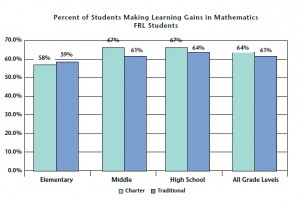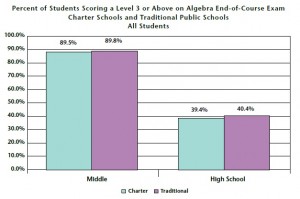
Florida’s charter school students continue to score higher, make larger gains and face smaller achievement gaps than their traditional-school peers, according to a new state report.
The annual report, based on student achievement data from the 2013-14 school year, largely aligns with the findings of six previous versions. Charter schools fare better in 154 of its 177 comparisons, which track proficiency, learning gains and achievement gaps for different student groups.
The report also shows that in Florida, charters on average serve fewer students who qualify for free- or reduced-price lunches, fewer students with disabilities, and fewer students who are classified as English-language learners than district schools. They also tend to serve fewer students who are classified as gifted, a stat not tracked in previous years’ reports. (Those statistics also likely mask some complexities, from varying student preferences to varying approaches to classifying students.)
Studies that control for student characteristics have generally found Florida charter school performance is roughly similar to that of traditional schools.
There are some nuances in the state report, too. While charter school students appeared to score higher and post larger gains than their peers in most measures of math achievement, they had slightly lower passing rates on the must-pass state algebra I exam.
At a time when more than a quarter-million students are enrolled in Florida charter schools and thousands more are seeking spots, the most telling comparisons may be between different jurisdictions, and among individual schools.
For example, the most recent study by Stanford University’s Center for Research on Education Outcomes (CREDO) found charters in some places, like Miami, perform quite well compared to traditional schools, while those in some other cities, like West Palm Beach, did significantly worse. The differences between schools, and between different authorizers, might hold insight into how the charter school sector can improve.


